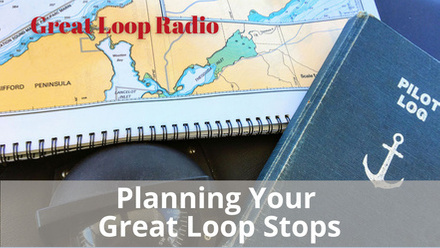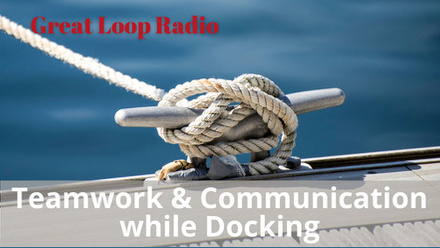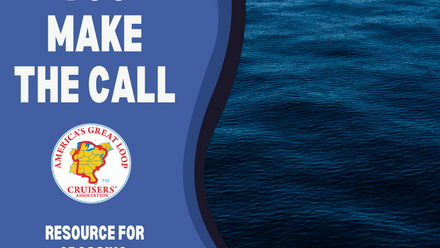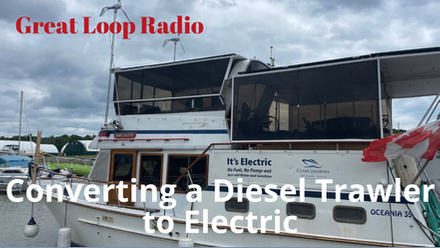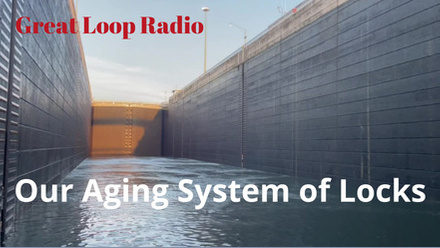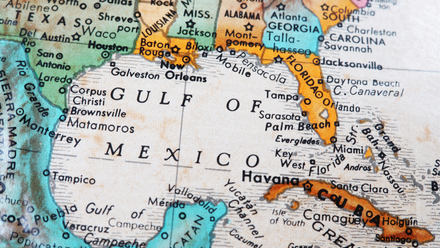How to Choose a Delivery/Training Captain
You've finally found your Loop boat. She passed her survey and sea trial with flying colors. Now, how do you get your new boat to your home port on Lake Michigan from where she sits in Florida? You could fly down to Florida and just begin your Loop from where she is currently docked, but you were hoping for a season to cruise locally first. Maybe you've never captained a boat quite this big before.
Maybe you reached out to your Home Port Crew, your yacht broker, or the AGLCA forum (or all of the above) for advice. You will likely be referred to many different delivery and training captains. But how do you choose the best one for you?
As you probably know, AGLCA has several sponsors who are delivery and/or training captains. You can find them in our Sponsor Directory but you still need to find a way to pick one that fits your needs.
We reached out to AGLCA's sponsor captains to give you the inside scoop about what you should be looking for.
Whether you are expecting the captain to deliver, train, or both, just as you would for any contractor working on your dirt home, you'll want to reach out to more than one captain and ask questions. Chris & Alyse Caldwell from Ask Captain Chris call this the interview. And that's really what it should be at this point. Sam Crouse from What Yacht To Do/Great Loop Academy also encourages you to get testimonials from the captain's previous clients. Think about what you want them to do for you, the distance they will be moving the boat, the particulars of the boat, and whether or not you will be onboard.
Delivery Only
Even if they are just moving the boat for you, it?s important to know who you are dealing with. It?s equally important that the captain knows what they are dealing with. Do you need it delivered by a certain date? Is it an older boat?
The Caldwells note that a good delivery captain will have:
- The ability and skill acquired from experience with boats of a similar size, make, and model.
- Responsibility that comes from having been a boat owner.
- Knowledge and understanding of new and vintage vessel systems.
Crouse adds that you want someone who "Holds the highest levels of honesty and integrity. They need to be very knowledgeable of the Rules of the Road as well as all other safe navigation practices. They must also be good stewards of the owner's expenses."
Mark S. Gillespie from On the Mark Yacht Services says, "A good delivery captain is one that is experienced, trustworthy, and willing to stop/delay a delivery due to unsafe conditions to the crew and/or boat."
Don't be afraid to ask them about their credentials. If you've spent any time on our public Facebook page, there are a lot of folks out there who say they are captains who may charge a lower fee to deliver your boat. Craig Allain at Captain Craig's Boating Services adds, "There are licensed captains that really do not possess the experience level needed to be competent." John Easley from Captain's Yacht Services suggests asking:
- How long they have had their license?
- What level is their license?
- What kind of boats do they generally run?
- Upon what waters do they normally operate?
Make sure to find answers to all these questions during the interview stage. Find out what the costs will be, does it cost extra for additional crew if that would be necessary, and ask if they will be in contact with you during the delivery process (especially if it's going to take a few days or the weather turns bad).
Make sure to do your due diligence by calling the captain's references. You've just spent many thousands of dollars on a boat that will be your home for the next year or more. Being thorough at the outset may save you aggravation later.
Jerry Hawk recommends asking questions you may not think are important, but can become issues later, "I think the first conversation should involve the question of drugs and alcohol." Gillespie seconds that by recommending you ask whether the captain smokes or drinks while underway.
What if I need training?
All of the captains we spoke with suggested that the best way to learn is to be onboard for the delivery. They are able to come to you and train you in your Home Port, but as Will Mason from The Captain's Coach notes, "The Great Loop isn't for the faint of heart and your training should reflect that. It will make your journey much easier if you put in the work ahead of time. If a client allows me to push them beyond their comfort zone behind the helm, I can make them an excellent boat operator in any circumstance."
Allain agrees, "I believe [training while on delivery] is the best way to learn. On a delivery, you cover many miles and encounter several different situations that may not be encountered while training near home port. These situations may include different docking situations, different Aids to Navigation, different tides and currents, and the occasional failure of one system or another."
The Caldwells add that if the captain is comfortable teaching, training while on a delivery is "one of the best ways a new boat owner can learn. Building each day on the foundation of the previous day helps create terrific muscle memory."
In other words, you'll be far more prepared to deal with whatever the Loop sends your way by having trained with the captain during the delivery. If you can at all swing it, make every effort to be onboard during the delivery. Not only will you learn valuable skills, but it may save you money if the captain doesn't need additional crew to come aboard.
Another thing to consider, Allain says, "My wife and I are a delivery and training team. My wife teaches all about line handling and seamanship along with logistics like finding marinas and such. She also teaches the crewman about some of the apps that are helpful for the captain...More than not, a couple being trained enjoys having a couple as trainers."
How much training will I need?
There is no clear-cut answer here. Hawk explains why: "Depends on if it's your first boat or you just have questions about docking or going thru the locks. Normally 4-5 days is about the maximum before it's time to go out and practice it." The other captains we spoke with gave similar time frames depending on your previous boating experience. Make sure you share with the captain your past experience.
Easley sums up possible training topics:
- General hydrodynamics
- Lots of boat handling
- Rules of the Road
- A little maritime law
- Coast Guard boardings
- Basic onboard systems
- Navigational markings
- Route planning
- Tides and current
- Man overboard drills
- Dealing with medical emergencies
- Driving and docking with a single engine
- Fire drills
- Knot tying
- Fender handling
- Anchoring practice
If there is anything you aren't sure about, now is the time to ask. Let the captain know what questions you have so they can make sure to cover it during your training.
All of this communication during the interview will give you a really good feel for the captain and help you determine if your personalities mesh. If they don't, you may want to keep looking ~ particularly for training. You need a captain who is patient and can teach in a way that you will easily learn. Not all captains can teach effectively to every boater.
Concerned the cost of learning what you don't know is going to break the bank?
It doesn't have to. Don't cut corners to save a few dollars. Crouse notes, "I do some online training before I come out which shortens the training cycle and decreases the cost."
But even if the captain doesn't offer online training, if you are onboard during the delivery, many captains will train you for no additional charge. Be sure to ask ~ don't just assume that training will be included with the delivery.
Some may offer discounts to AGLCA members.
So what IS the cost?
- Delivery only ~ Expect anywhere from $400-750 a day plus expenses (if a crew member is needed, add another $150-400 a day plus expenses)
- Training only ~ You're looking at prices ranging from $400-750 a day plus expenses.
- Delivery and training ~ Some captains will include training at no additional cost if the owner is aboard during the delivery but confirm that with the captain upfront so you aren't surprised later.
Again, don't cut corners to save money. Mason cautions, "Be mindful of captains who charge low rates. Good captains that make a living on the water know their value. You will receive their full value and dedication in return."
What about insurance?
I'm so glad you asked. In the event the boat is damaged during delivery or, God forbid, something happens to the captain or a hired crew member, you as the boat owner are responsible (except in cases of gross negligence), so make sure you have spoken with your insurance provider. Let them know you have a captain (crew) hired to deliver your boat and/or train you onboard and ask what you need to do to be sure they will be covered. Crouse notes that, "Most companies insure a licensed captain automatically as part of their policy, but I encourage you to ask about this." You may need to add the captain and crew to the policy as additional covered and your insurance provider may want to vet the captain if you aren't going to be aboard. Find out early enough in the process so you have plenty of time to get what your insurance provider needs before the captain drops the dock lines.
What does a captain look for in a trainee?
"Someone with a desire to learn," says Hawk. All the training captains agreed that an eagerness to learn and a sense of adventure are important. Remember the captains love what they do. They want you to be safe and enjoy your time on the water. The more you are enjoying the process, the more they enjoy it.
- Have a sense of humor
- Ask questions and listen to the answers
- Don't be afraid to try
Buying your Loop boat is exciting. You've read so much about the route on our website, (and maybe attended a Rendezvous or two), that you can just see yourself cruising Georgian Bay, or wintering in the Florida Keys. But don't jump ahead and skip this very important part of the process. Delivery and training from one of our AGLCA Sponsor Captains will help set you up for an amazing adventure!

